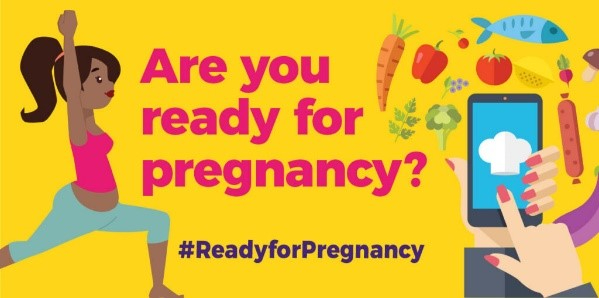If you are planning a pregnancy, you can improve your chances of a healthy pregnancy by making some changes to your health and lifestyle now.

Please click here to find out more about the Ready for Pregnancy campaign. For further languages, click here.
Please see the below links and advice to support you:
There is lots of information on the NHS website
- If you have pre-existing medical conditions, talk to your consultant regarding the specific advice to you and to discuss medications. Never stop taking medication without talking to your doctor.
Obtaining a healthy weight and healthy diet (Have a healthy diet in pregnancy - NHS) is not only important for a healthy lifestyle, but is even more important if you are pregnant or planning to have a baby. You can continue to exercise Exercise in pregnancy - NHS during your pregnancy, in fact we recommend that you do. We know that exercise, whether it be walking, swimming, or going to the gym, is great for you during your pregnancy and can reduce complications later in pregnancy.
You can use a BMI calculator (Calculate your body mass index (BMI) for adults - NHS) to work out your BMI. Ideally a BMI under 30 is optimal when you become pregnant. We know that there are additional risk factors with raised BMI over 30 in pregnancy, which increases further in people with a BMI over 35. Some of the risks with raised BMI include increased risk of thrombosis, gestational diabetes, high blood pressure, pre-eclampsia, induction of labour, caesarean birth, anaesthetic complications and wound infections. Being overweight in pregnancy and after birth | RCOG
- Stop smoking: SASH Maternity are proud to announce that we are able to provide free support for partners and or family members of pregnant women to stop smoking.Stopping smoking when close to pregnant women can reduce the chances of the baby being born small, too soon and sick
Support can include -
Nicotine products, including patches and vapes, to help with cravings
Friendly, non judgmental appointments with a trained advisor
If you would like to take the opportunity to improve the health of yourself and the new baby, please email sash.tda@nhs.net
- Stop drinking alcohol: We are not sure about the effect of small amounts of alcohol, because the way the body handles alcohol is different for different people. However, we do know that alcohol crosses the placenta to the unborn baby, and can cause an increased risk of brain damage to your baby, so being alcohol-free is safest. This is especially true during the first three months of pregnancy as this is when the baby’s brain is developing. Because you will not know you’re pregnant for the first few weeks, the safest thing to do is not drink any alcohol at all if you’re trying for a baby.
There are lots of ways to maximise your health during pregnancy.
Supplements and Vitamins in pregnancy
Vitamins are needed for growth and development. Apart from vitamin D, which we get from sunlight, most vitamins come from our diet. In the UK, it is quite common for people to be low in vitamin D and folic acid. These vitamins are important in pregnancy and you can boost your levels by taking a vitamin supplement. Supplements of other vitamins are not usually routinely advised and Vitamin A may actually be harmful in pregnancy.
-
Folic Acid Supplements are recommended for all pregnant people planning a pregnancy. Folic acid reduces the chance of your baby having a neural tube defect, such as Spina Bifida. We recommend taking a 400 microgram supplement of folic acid every day before becoming pregnancy and every day afterwards until you are 12 weeks pregnant. You can buy Folic Acid at your local pharmacy. If your BMI is over 30 or if you have additional risk factors such as: diabetes, family history of neural tube defects, epilepsy, sickle cell, or are taking anti retroviral medications, you will require a higher dose of folic acid 5mg. This higher dose will need to be prescribed by your GP or consultant.
-
Vitamin D We recommend that all women take at least a 10mcg Vitamin D supplement daily in the winter months of September to March. This is to reduce the risk of bone density complications for both you and your baby. If you are Black, Asian, from a Minority Ethnic group, aged over 35 years or with a BMI higher than 30, or cover your skin when outside, or spend lots of time indoors, we would recommend you take a daily dose. It may even be recommended that you take a higher dose of 25mcg. Do not take more than 100 micrograms (4,000 IU) of vitamin D a day as it could be harmful. Healthy eating and vitamin supplements in pregnancy Vitamins, minerals and supplements in pregnancy - NHS.
-
Vegetarian, vegan and special diets in pregnancy, A varied and balanced vegetarian diet should provide enough nutrients for you and your baby during pregnancy but you might find it more difficult to get enough iron and vitamin B12. Talk to a midwife or doctor about how to make sure you're getting enough of these important nutrients. If you're vegan or you follow a restricted diet because of a food intolerance (for example, a gluten-free diet for coeliac disease) or for religious reasons, talk to a midwife or GP. Ask to be referred to a dietitian for advice on how to make sure you're getting all the nutrients you need for you and your baby. Vegetarian and vegan diets during pregnancy
-
Vitamin C, Although routine supplements of vitamin C are not specifically recommended when you are pregnant, this vitamin helps iron to be absorbed. This may be of benefit because while you are pregnant you are at risk of becoming anaemic.
-
Vitamin A, Too much vitamin A can harm the development of your baby’s nervous system. During pregnancy, avoid any supplements that contain more than 700 micrograms (µg) of vitamin A and don’t eat foods such as liver, liver products (pâté) or fish liver oils that may contain this vitamin in high levels.
-
Healthy Start vitamins, The Healthy Start scheme may be able to help you buy food and milk if you're pregnant or have a child under 4 years old and receive certain benefits, or you’re pregnant and under 18. If you're eligible, you'll be sent a Healthy Start card which you can use to buy certain types of milk, infant formula, fruit and vegetables. You can also use your card to get free vitamins. If you're not eligible for the Healthy Start scheme, some NHS organisations still offer the vitamins for free, or sell them. Ask a midwife about what's available in your area.
-
For more information please speak to your midwife or GP, alternatively click on the following links.
- Stop smoking: Smoking during pregnancy has been linked to a variety of health problems for your baby; premature birth, low birth weight, Sudden Infant Death Syndrome, miscarriage and breathing problems in the first 6 months of life.
- Exercise and pelvic floor exercises
- Sleep: The safest position to go to sleep is on your side, either left or right. Research suggests that, after 28 weeks, falling asleep on your back can double the risk of stillbirth. This may be to do with the flow of blood and oxygen to the baby. Do not worry if you wake up on your back – the research looked at the position pregnant people fell asleep in, as this is the position we keep for longest. If you wake up on your back, you can just turn over and go to sleep again on your side. It can be normal to experience insomnia, weird dreams and tiredness in pregnancy too.
- Your Mental Health: coping with concerns and feelings and mental health in pregnancy. If you are concerned about your Mental Health, please either talk to your GP and talk to your Midwife. Please see our Mental Health and wellbeing
- Sex: It is safe to have sex in pregnancy and it will not harm you or your baby. There may be some pregnancy conditions that mean your midwife/Doctor will advise you to avoid sexual intercourse as part of your personalised care plan.
- Travel: consider vaccines, long journeys and flying advice
If you have a pre-existing medical condition that requires you to take medication, it is important that you consult a Doctor who can advise you on whether it is safer for you to continue this medication or review starting an alternative/ reducing /increasing your dose when you are pregnant. Please DO NOT stop taking medication without consulting a professional.
During your pregnancy you will be offered some vaccinations, you community midwife will discuss these with you during your antenatal appointments.
You will be offered both your Whooping cough, RSV vaccine (RSV vaccine - NHS), and depending on the time of year, also the flu vaccine. These are recommended and deemed safe by robust clinical trials for all pregnant women. Your midwife will advise on the best way to book these.
Whooping cough and pregnancy booklet (publishing.service.gov.uk)
COVID-19 vaccines are also strongly recommended in pregnancy. Please see link to FAQs produced by the Royal College of Obstetricians and Gynaecologists. COVID-19 vaccination information from breastfeeding and pregnant parents.
Once your baby is born, they may be eligible for a BCG vaccination. Please use the link for further information. https://
- Not every pregnant person will experience the same early pregnancy signs and symptoms and the severity of each symptom will differ too.
- “Morning Sickness”
- Feeling sick (nauseous) or being sick can start around 4-6 weeks of pregnancy is commonly known as “morning sickness” – although this can happen at any time of day.
- You can reduce the symptoms of morning sickness by ensuring that you get plenty of rest; eat regular, small meals; drink plenty of fluids and avoid smells that make you feel sick. You may also want to consider accu- pressure or anti-sickness medication that your GP can prescribe for you.
- If you are unable to keep any food or drink down and are vomiting frequently, please contact our Early Pregnancy Unit if you are less than 16 weeks of pregnancy. This can be a serious condition in pregnancy called hyperemesis gravidarum and requires additional support and treatment.
- Feeling tired or exhausted can be very common in pregnancy. It is important to make time to relax and look after your physical and mental wellbeing by eating a healthy diet, exercising, getting plenty of sleep and accepting offers of help from your partner, friends and family.
- Due to the pregnancy changes, you may find that your breasts become larger, tenderer, veins may become more visible and the nipples may darken. Towards the end of pregnancy, you may find your nipples leak colostrum, the first breastmilk for baby. Do not worry if you do not leak, does not impact on your ability to breastfeed after the birth. For more information on colostrum and harvesting this in the antenatal period, see our page Feeding and Caring for your baby.
- Despite the pregnancy changes in the breasts, it is important to regularly check for signs and symptoms of breast cancer. If you are concerned, please speak to your GP.
- Other symptoms of pregnancy can be increased need to urination, including during the night, constipation and increased vaginal discharge (without any other symptoms)
- Your baby’s movements: You may start to feel movements from 16 weeks of pregnancy however if this is your first baby, this can be after 20 weeks of pregnancy. To start with, movements may feel like a flutter, then progress to a swish, kick or roll. Charities such as Kicks Count are a good source of information. If you are ever concerned about your baby’s movements please call our maternity triage line on 01737231764, to speak to a midwife, available 24 hours a day.
- Deep Vein Thrombosis (DVT): A DVT is a serious medical condition where a blood clot forms in a deep vein, commonly in the leg. If you have any symptoms of a DVT, call our Maternity Triage immediately on 01737 231 764. Symptoms of a DVT include: pain, swelling and tenderness in one leg, usually at the back of your lower leg (calf) – the pain may be worse when you bend your foot up towards your knee, a heavy ache or warm skin in the affected area, red skin, particularly at the back of your leg below the knee, shortness of breath.
 Start4life offer expert advice, videos and tips on pregnancy, birth and beyond.
Start4life offer expert advice, videos and tips on pregnancy, birth and beyond.
You can sign up to Start4Life’s weekly emails.
 Fathers in Surrey now have access to an exciting new online resource, DadPad.
Fathers in Surrey now have access to an exciting new online resource, DadPad.
The free easy-to-use online app has been developed to support dads, and particularly new fathers, to help guide them into fatherhood.
